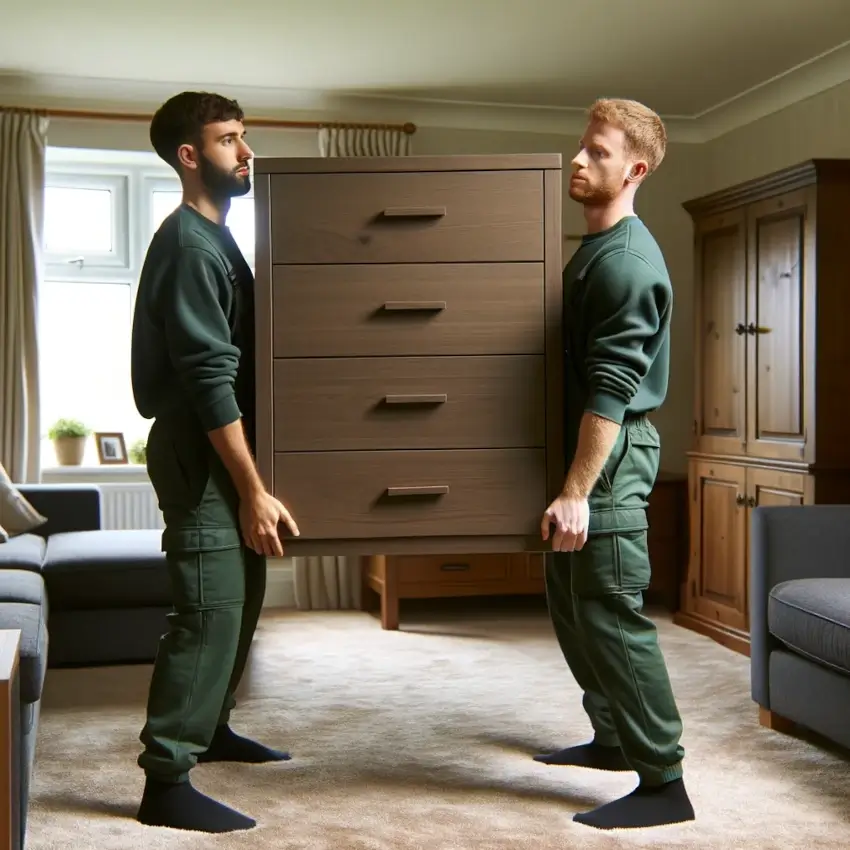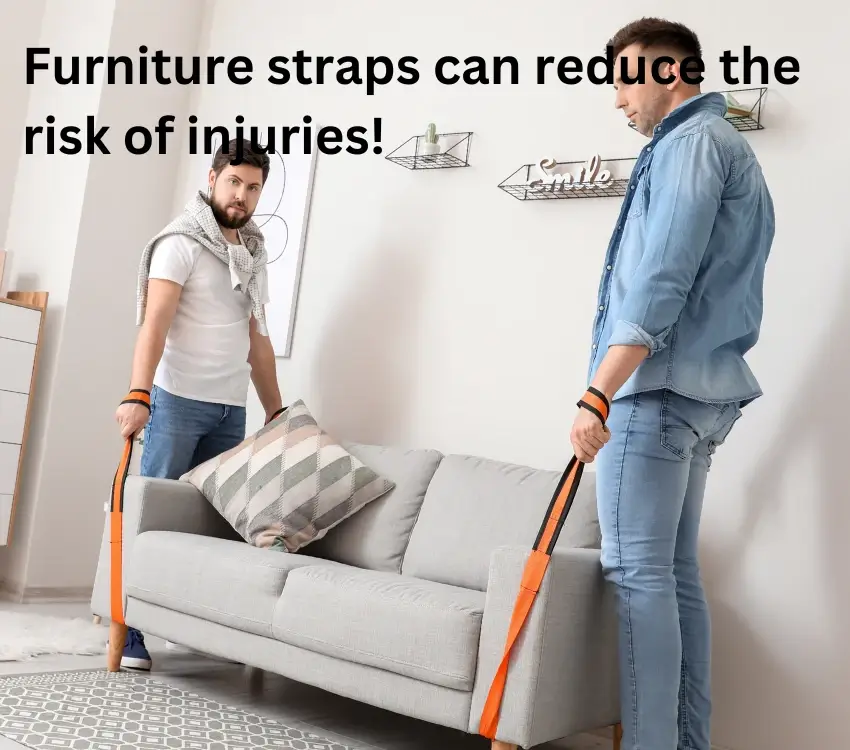Moving Furniture On Carpets
Moving furniture on carpets is easy, but if it is not done properly you could easily damage the carpet or even damage the furniture. If you are using our moving services, our removal men use two main techniques – by using a dolly or by lifting and carrying the furniture. But how about if pulling or pushing the heavy furniture is the only way around? In this article we share our experience on how to move furniture on carpets.

Carrying Heavy Furniture With No Equipment
Assess and Prepare. Before attempting to lift any piece of furniture, assess its weight and size. Determine if you can safely lift it alone or if you will need assistance. Remove any drawers or loose components to make the piece lighter and more manageable. If the item is particularly large or awkward, consider disassembling it into smaller parts.
Use Proper Lifting Techniques: When lifting furniture, always use the proper form to prevent injury. Bend at the knees and hips, keeping your back straight, and lift with your legs rather than your back. Avoid twisting your torso while lifting or carrying furniture, as this can lead to strain or injury.
Get a Good Grip: Ensure you have a firm grip on the furniture before attempting to lift it. If the item is too large to grasp comfortably, use lifting straps to secure your hold. These straps can also help distribute the weight more evenly, making the lift easier.
Keep It Close: Hold the furniture close to your body as you lift and carry it. This helps maintain your balance and reduces strain on your back and arms. Keep the heaviest part of the item centered to prevent it from tipping.
Communicate Clearly: If you’re lifting and carrying furniture with others, communication is key. Designate one person to direct the move, calling out any obstacles or changes in direction. Ensure everyone is ready before lifting, and keep communicating throughout the move.
Take Your Time: Moving furniture is not a race. Take your time, and move carefully and deliberately. If you need to navigate stairs or tight spaces, plan each step before proceeding.
Protect Your Surroundings: Protect your floors, walls, and doorframes with padding to prevent scratches or dents. Be mindful of your surroundings as you move, and be prepared to stop and adjust your grip or path as needed.
Know Your Limits: If a piece of furniture is too heavy or awkward, don’t risk injury by attempting to move it yourself. Ask for help or consider hiring professional movers for larger items. It’s better to take the time to find assistance than to risk hurting yourself or damaging your furniture.
Why worry about how to move your furniture when you can hire pros? Compare professional house movers to save money.
Moving The Furniture On Carpets Using Equipment
Choose the appropriate trolley or doll! Ensure it’s sturdy enough to handle the weight of your furniture and has large, non-marking wheels that can roll smoothly over carpets. Dollies with swivel wheels offer better maneuverability.
Prepare the Furniture! Before moving the furniture, remove any loose items or drawers to prevent them from falling out. If possible, disassemble larger pieces to make them easier to handle. Protect the furniture with blankets or padding to prevent scratches and dings.
Clear a Path. Plan your route and clear any obstacles from your path. Ensure there is enough space to maneuver the dolly and furniture through doorways and around corners.
Loading. Tilt the furniture slightly and slide the dolly underneath. Make sure the furniture is centered and balanced on the dolly to prevent tipping. Secure the furniture to the dolly using straps or bungee cords to keep it in place during the move.
Moving the trolley on the carpet. When moving on carpets, push the dolly forward using even, controlled movements. Avoid jerky or quick motions, as this can cause the furniture to shift or the dolly to become stuck. If the carpet pile is thick, you might need to apply more force to get the dolly moving.
Navigating Obstacles. If you encounter any obstacles like thresholds or uneven surfaces, approach them straight on and at a slow, steady pace. For thicker carpets or high-pile rugs, you may need to lift the dolly slightly to help the wheels roll over the surface.
Unloading the Furniture. Once you’ve reached your destination, carefully tilt the furniture to one side and slide the dolly out from underneath. Ensure the furniture is placed in the desired location before removing the protective padding and reassembling any disassembled parts.
Safety First. Throughout the moving process, prioritize safety. Wear closed-toe shoes, bend at your knees (not your waist), and keep your back straight when lifting. If the furniture is too heavy or unwieldy, don’t hesitate to ask for help or consider hiring professional movers.
Related Article
How to move a fridge?
What Extra Equipment I Can Use When Lifting And Carrying?
When lifting and carrying furniture by hand, utilizing extra equipment can significantly enhance safety and efficiency. Furniture straps or lifting harnesses can distribute weight more evenly across your body, reducing strain on any single muscle group and improving your grip. Moving gloves can protect your hands from splinters and provide a better grip, while foam padding or blankets can be used to wrap around sharp edges or delicate surfaces, preventing damage to both the furniture and your home.

What Precautions Should I Take To Protect My Furniture While Moving It?
To protect your furniture during a move, it is crucial to invest in the right materials and employ careful handling techniques. Begin by disassembling larger pieces of furniture, if possible, and secure any loose or moving parts with tape or wrapping. You can use removal blankets to cover and cushion your furniture, paying extra attention to corners and delicate areas to prevent scratches, dents, or other damage. As the blanket could be slippery, use pallet wrap to hold the blanket attached to the furniture and increase the friction so it doesn`t slip on your hands. Ensure that all items are securely packed and stabilized in the moving vehicle, preventing any movement that could cause harm to the furniture during transit.
Check also: How to protect floors when moving?
Is It Possible To Slide Heavy Appliances, Like Refrigerators Or Washing Machines, Across the Carpet?
Yes, it is possible to slide heavy appliances like refrigerators or washing machines across carpet, but it requires proper precautions and equipment. Using furniture sliders or an appliance dolly specifically designed for carpets can help distribute the weight evenly and reduce friction, making it easier to slide the appliance. However, it’s crucial to clean the carpet beforehand to remove debris, ensure the path is clear of obstacles, and if possible, have someone assist you to guide the appliance and prevent any potential damage to the carpet or the appliance itself.
How Can I Protect My Carpet When Moving Furniture In And Out Of My Home?
Protecting your carpet while moving furniture in and out of your home requires thoughtful preparation and the use of appropriate materials. Start by laying down protective pathways using carpet film protectors, heavy-duty canvas drop cloths, or flattened cardboard boxes, creating a barrier between the furniture and the carpet. Ensure that the protective materials are securely taped down to prevent slips or trips. If possible, disassemble larger pieces of furniture to reduce their size and weight, minimizing the impact on your carpet. Additionally, use furniture sliders specifically designed for carpeted surfaces, or place a sturdy material like plywood under the furniture, to help distribute the weight and reduce the risk of carpet indentation or damage.
Related Article
Moving Gym Equipment Tips 🏋️
Are There Any Materials That I Should Avoid Placing Directly On My Carpet When Moving Furniture?
There are certain materials you should avoid placing directly on your carpet when moving furniture to prevent damage. Avoid using hard or sharp objects such as metal tools or dollies without proper padding, as they can tear, dent, or otherwise harm the carpet fibers and backing. Materials with rough or abrasive surfaces, such as unfinished wood or certain plastics, can also cause friction that may lead to snags or wear on the carpet. Instead, opt for soft, smooth materials like furniture sliders, thick blankets, or felt pads, which provide a protective layer between the furniture and the carpet. Ensure any protective materials are clean and free from debris to prevent inadvertent scratching or staining during the move.
How Can I Prevent My Furniture From Leaving Indents In The Carpet?
To prevent furniture from leaving indents in the carpet, distribute the weight more evenly by using wide furniture coasters or pads under the legs of the furniture. Regularly rearrange the furniture slightly or change its position entirely to give the carpet fibers a chance to recover and prevent permanent indentations. Additionally, consider using carpets with a shorter pile and denser padding, as they are more resistant to indentations from heavy furniture.
If you believe this can help someone else, please share it. Thank you.
Moving Request
Fill in your removal details, so we can match you with the best 5 local movers.
NOTE: Each company will contact you individually by phone or email. All arrangements regarding prices and services will be strictly between you and the removal company you choose.
IMPORTANT: We will share the details you submit only with the companies which will contact you. We will not share your details with anyone else. If you wish to cancel your request or for any other issues email us at support@bookhouseremovals.co.uk
